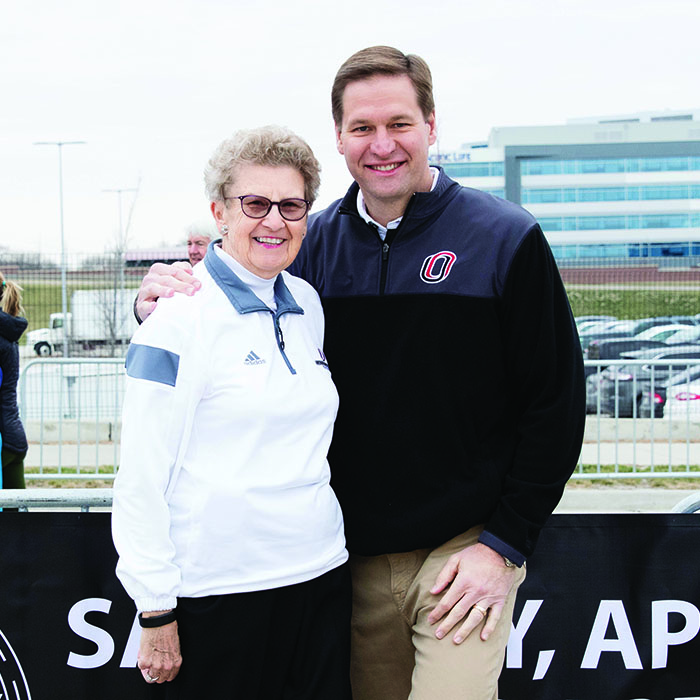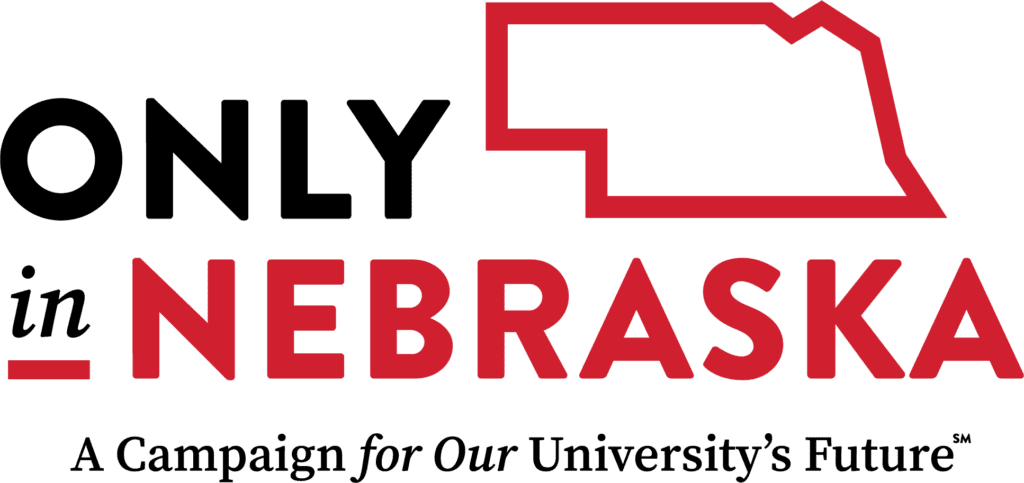Connie Claussen


Here’s how to become a queen …
ABOUT THIS PHOTO: Connie Claussen and Trev Alberts attend the Claussen-Leahy Maverick Run
Once upon a time, the University of Nebraska at Omaha had a queen.
She reigned with passion from a castle of corrugated metal — a Quonset hut — where the women who competed in sports had to play. This was long, long ago, back in the days before Title IX, when the women’s athletic teams didn’t have the facilities or the money or the support the men’s teams did.
The Quonset hut was shaped like a half-moon. It looked like an airplane hangar from World War II. It was old and hot, and its roof was made of tin.
The women had no real uniforms, either, at first, just sweaters and shorts they’d bought from the bookstore. They made jersey numbers out of electrician’s tape. On their few trips to play other teams, they drove their own cars and bought their own burgers, and they couldn’t go far, because of the cost.
But it was 1969, and the rising tide of the times was on their side.
And so was their queen:
Connie Claussen.
She laughs.
“They called me The Queen of the Quonset Hut,” said Claussen, UNO’s athletic director emeritus now. “It was difficult back then. But we’ve come a long way from the very beginning.”
Women’s athletics began at UNO in 1969, when the Omaha Softball Association asked Claussen to help start the Women’s College World Series (CWS) in Omaha. UNO would be the host. But how could it be a host if it didn’t have a team?
Claussen started one. And coached it. And helped raise money for it.
That first year, her team went 0-2 in the women’s CWS. The next year, UNO added teams for women’s basketball and volleyball. Claussen coached those, too. And bowling, which was funded by the student center. Title IX began in 1972. But it still was a long, long time, she said, until the playing field was evened out.
In 1975, when she and her softball players won the national title, they had to raise money for a sign to put up on the front of the Eppley Administration Building, congratulating themselves.
She keeps a framed photo of that team on the wall of her basement. She likes to look at it.
And remember. And smile back at those smiling faces.
“I look at those players a lot,” she said. “I don’t think anybody was on scholarship yet. And if they were, it was maybe a hundred dollars. Those players didn’t have anything, but they enjoyed it, and when I look at them now I think, at least they got an opportunity to compete.”
That photo is among the artifacts that Claussen, who retired in 1998 as the assistant athletic director, will donate to the UNO archives when she dies.
“It’s spelled out,” she said. “I want whoever is in charge of the archives to come see what they want.”
Claussen gave a lot of herself along the way. She donated her own money to support the women, mainly for better facilities. Her name is on a donor wall beside the new soccer pitch. She created a scholarship in her name. In 1986, she started the major fundraiser for women’s sports at UNO called the Diet Pepsi Women’s Walk. It has raised more than $4 million over the years.
The walk is now named for her and for her late friend and boss, Don Leahy, the athletic director who arrived at UNO in 1974 and was an advocate for women’s sports.
Trev Alberts, UNO’s current vice chancellor for athletic leadership and management, has been a big supporter, too. He was at the Claussen-Leahy Maverick Run last month. They posed for a photo.
“Trev works really hard,” Claussen said, “to make sure the women get the same treatment as the men.”
She’s 79. She stays fit. She walks 2 to 3 miles, most days, at the mall. She fishes in the summers at her Minnesota cabin.
Why does she give back now?
“UNO has been very, very good to me,” she said. “It was a struggle to begin with, but it’s been good to me. It’s kept me busy. I had a lot of great parents and people in the community who got involved and helped me out. That was especially important in the beginning.
“You don’t do this by yourself. And a lot of people have helped me out, and they’re still helping me.”
In her role as emeritus AD, she goes to the office every two weeks, from September through April, for executive staff meetings. She gives advice when needed. She’s good at raising money, for all sports, so she takes a lot of donors to lunch.
She writes a lot of thank-you notes.
What do you tell them?
“I really don’t have to say much,” she said. “I think they see the product UNO has and the need and how much the student-athletes appreciate it and how they do great in the classroom, graduating and staying out of trouble.
“It’s a pretty simple sell for UNO athletics.”
Claussen, a Burnett Society member, has remembered UNO in her will, with planned gifts to The One Fund to support women’s sports and to the Connie Claussen Women’s Athletic Scholarship Fund.
And so the queen’s story will end the way it began, giving back.
Happily ever after.





